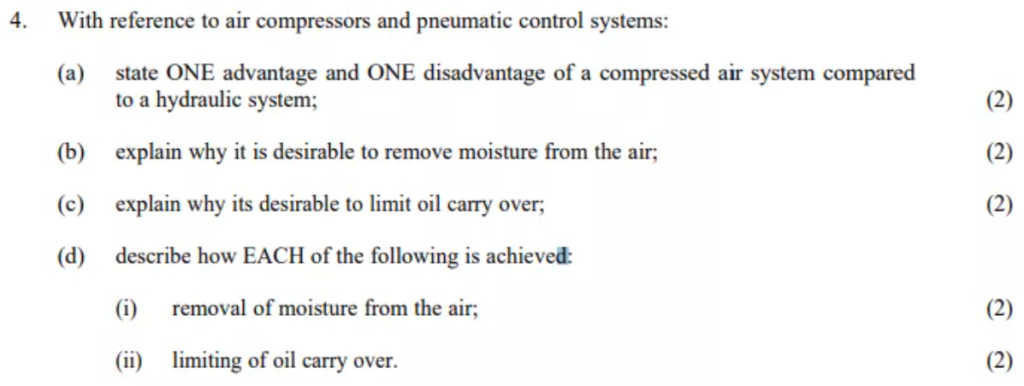
Air Compressors vs. Hydraulic Systems and Maintaining Clean Air
(a) Advantage and Disadvantage of Compressed Air vs. Hydraulic Systems:
- Advantage: Clean and Environmentally Friendly: Compressed air systems are generally cleaner and more environmentally friendly. Leaks pose less risk of environmental contamination compared to hydraulic fluid leaks.
- Disadvantage: Lower Power Density: For the same size actuator, compressed air systems can transmit less force compared to hydraulic systems due to the compressibility of air. Hydraulic systems are better suited for high-power applications.
(b) Importance of Removing Moisture from Compressed Air:
Moisture (water) in compressed air is undesirable for several reasons:
- Corrosion: Water can cause corrosion of metal components within the system, including pipes, valves, cylinders, and actuators. This can lead to sticking valves, reduced performance, and premature component failure.
- Freezing: In cold environments, moisture can freeze within the system, causing blockages and potentially damaging components due to pressure surges.
- Reduced Efficiency: Moisture can interfere with the lubrication properties of compressed air, leading to increased friction within moving parts. This reduces the overall efficiency of the system and shortens the lifespan of components.
- Reduced Service Life of Components: Water can erode seals and damage internal components of valves and actuators, leading to premature wear and tear.
Therefore, removing moisture from compressed air is crucial for reliable operation, efficient performance, and extended lifespan of the pneumatic control system.
(c) Importance of Limiting Oil Carry Over:
While some control systems utilize oil, limiting oil carry over in most pneumatic applications is desirable for these reasons:
- Gumming: Oil can build up on internal surfaces of valves, solenoids, and other components over time. This can cause them to stick or malfunction, hindering proper operation of the control system.
- Contamination of Downstream Equipment: Oil can contaminate downstream processes or products that are sensitive to oil contact. This can lead to product defects or safety hazards.
- Compatibility Issues: Certain materials used in control components might not be compatible with oil, leading to degradation or damage.
Therefore, minimizing oil carry over helps ensure smooth operation, prevent contamination of downstream equipment, and avoid compatibility issues with components.
(d) Methods for Maintaining Clean Air:
(i) Removing Moisture from Air:
Several methods can be employed to remove moisture from compressed air:
- Refrigerated Air Dryers: These dryers use refrigeration to cool the compressed air, causing moisture to condense and separate from the air stream. The condensate is then drained automatically.
- Desiccant Air Dryers: These dryers utilize desiccant materials that absorb moisture from the compressed air as it passes through. The desiccant is then regenerated by heat or purging with dry air.
- Membrane Dryers: These dryers use semi-permeable membranes that allow water vapor to pass through but not air. This separates the moisture from the compressed air stream.
(ii) Limiting Oil Carry Over:
Several methods can be used to limit oil carry over from lubricated compressors into the air stream:
- Aftercoolers: These heat exchangers cool the compressed air after leaving the compressor. This helps condense and separate oil vapors from the air stream.
- Oil Separators: These separators utilize baffles, filters, or centrifugal force to remove oil droplets from the compressed air stream.
- Coalescing Filters: These filters contain fine fibers that allow air to pass through but trap oil droplets due to surface tension. This helps coalesce the oil droplets into larger drops that can be drained from the filter.
By implementing these methods, compressed air systems can be equipped to deliver clean, dry, and oil-free air for optimal performance and longevity of pneumatic control systems.